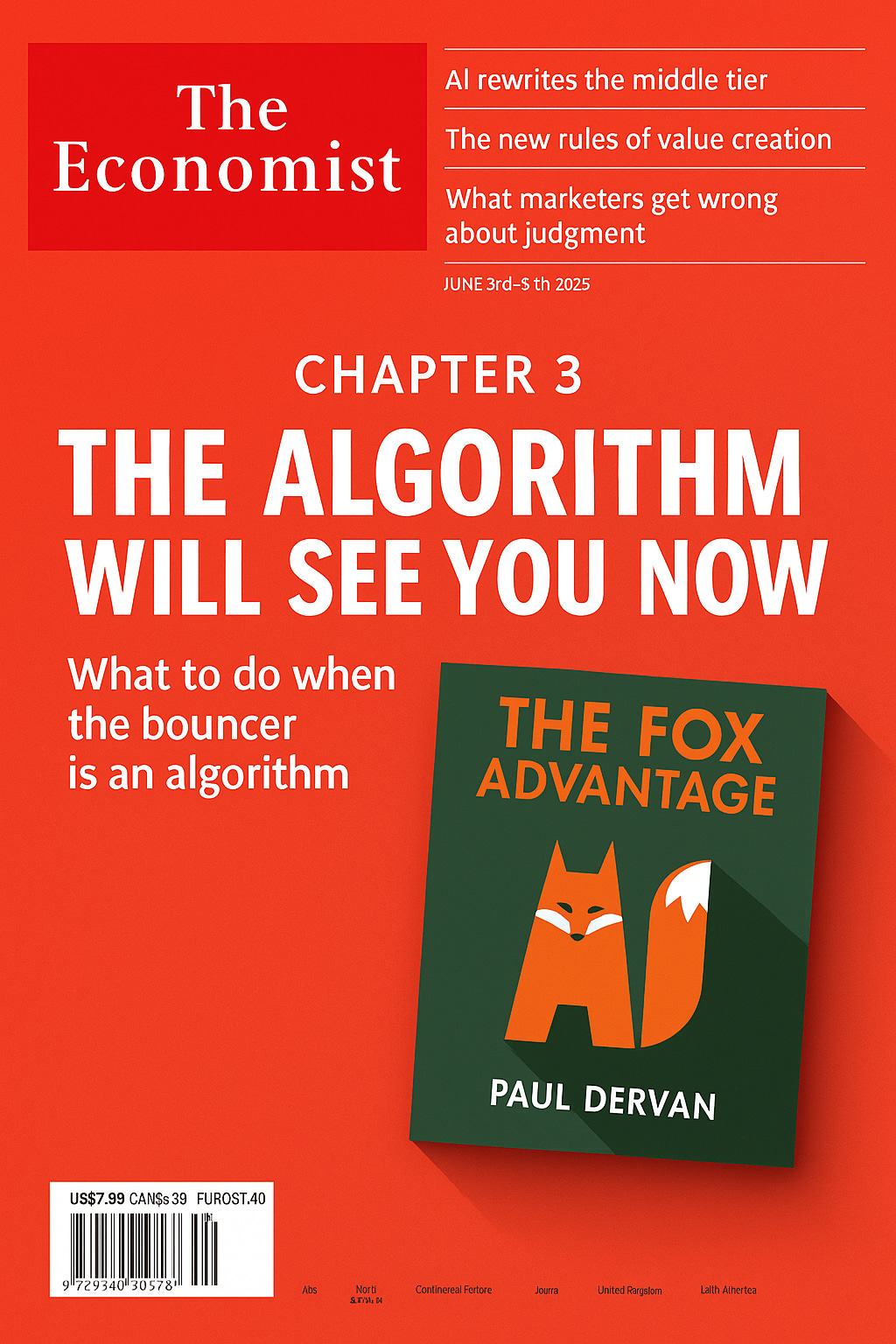Chapter 3: The Algorithm Will See You Now
From "The Fox Advantage" by Paul Dervan | Part 1: What Just Collapsed
Four seconds. That's how long it took my mate Bryan to rage-quit a retail site last week. Four seconds of lag, and he shut the laptop like it had personally insulted his mum. This is the same lad who'll queue twenty minutes for coffee served by someone with a handlebar moustache and a jazz studies degree.
But online? Zero tolerance. No second chances.
I watched this happen in my kitchen, and I felt the gears of commerce grind sideways. We're not just competing for attention anymore. We're competing to pass a test we can't see, set by a system that doesn't care if we've been in business since 1987.
The algorithm will see you now. Whether you're ready or not.
Why our old playbook is toast
Used to be simple. Fight for eye-level shelf space in Tesco. Premium position, premium price. Done.
Now? Your customer types "best" and something else, and a system decides what shows up. Not you. Not your media budget. Not your award-winning campaign that everyone loved last year.
The algorithm.
Dad used to say a rushed diagnosis is just a polite misdiagnosis. But algorithms don't have the luxury of time – they're making judgments in microseconds. Every bounce. Every scroll. Every time someone clicks away after three seconds because your site loads like it's running on dial-up.
My neighbour (here in sunny south Dublin) gives me a hard time - insists that marketing is just a sharp logo, knowing the right people and the right golf handicap. Lovely bloke - but he’s wrong. These days you're being scored by a machine that doesn't play golf, couldn't care less about your logo, and certainly doesn't do lunch.
You're not being browsed anymore. You're being filtered.
So what do you do when the bouncer is an algorithm?
Don't try to outsmart it. You won't. It's faster than you, processes more data than you, and never gets hungover on a Friday morning.
But here's the rub: The algorithm can decide what shows up, but it can't decide what sticks. That's still your job.
Think about it: our robot friends can tell you that 73% of people who viewed your product also looked at your competitor. But it can't make someone remember why they should care about you on a rainy Tuesday in six months' time.
The system serves. You make it memorable.
When AI predicts what people want before they know they want it, your job is to be the brand they trust when they get it. When everything's personalized, your job is to feel genuinely personal (although not creepy-personal). When everyone's instant, your job is to create the moments people want to come back to.
Five things I'd start with
1. Murder your loading screens
If your site loads slower than your granny getting out of a chair, you've lost before you've started. Test everything like you're operating on three hours' sleep, three espressos, with one eye constantly distracted by very energetic twin boys. Because that's your customer's state of mind.
2. Stop trying to beat the machine at its own game
You'll lose. Every time. Instead, ask: what does my brand make people feel that ChatGPT can't replicate? That's your unfair advantage.
3. Give the chores to the robots
Use AI to write your first draft, sort your data, handle the admin that makes everyone want to quit marketing. Keep humans for the stuff that matters: judgment, wit, the ability to spot when something smells off.
4. Design for the rewatch, not just the click
Getting someone to click once is easy(ish). Getting them to remember you exist next week? That's the real game.
5. Accept that the algorithm is your new front door
Every interaction is a vote. Every delay is a black mark. The system is keeping score whether you like it or not. Damn robots. So ask yourself: if the algorithm had to choose between you and your competitor right now, who would it pick?
The other day one of nine‑year‑olds, Alex, asked what I do now. "I help brands earn their spot when the robots decide what shows up" I said. He shrugged, went back to Minecraft. Although I’m taking that as approval.
Next week: Chapter 4 - getting picked before anyone even searches.




